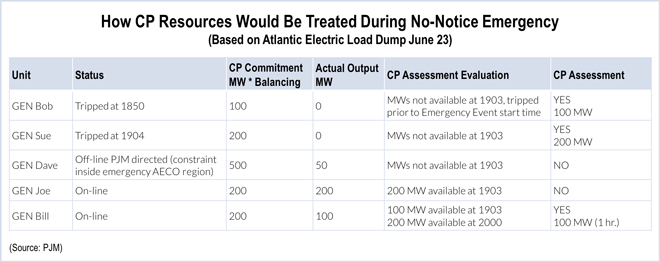By Rich Heidorn Jr.
Members warned PJM officials last week that the way the RTO plans to calculate Capacity Performance could lead generators to ignore dispatch instructions to avoid penalties.
PJM expects generators’ output to match their Capacity Performance obligations even at the beginning of a no-notice emergency, leaving no allowance for ramping. That could lead generators that are not producing at their full CP commitment when the emergency is called to exceed their obligation later in the hour to avoid or minimize penalties, stakeholders said.
The discussion came during an Operating Committee briefing by PJM officials on the operating impacts of the rule changes and how they would assess penalties under several scenarios.
“We could have a lot of people not following PJM dispatch on no-notice events just to avoid these penalties,” said Ed Tatum of Old Dominion Electric Cooperative.
Gabel Associates’ Mike Borgatti said the rules could result in “perverse” market results. “It seems like a weird incentive structure,” he said.
“PJM [could] lose control of the system,” agreed David Pratzon of GT Power Group.
Vice President of Operations Mike Bryson acknowledged that the rules could lead to penalties for a generator, for example, with a 200-MW CP obligation that is producing only 100 MW at PJM’s instructions when an emergency is called. (See “GEN Bill” example in chart.)
“Right now I think that’s the case,” he said. “We’ll take it back for more discussion.”
Performance Assessment Hours
The briefing focused on “Performance Assessment Hours” — whole or partial clock-hours for which PJM has declared an Emergency Action in response to locational or system-wide capacity shortages. Emergency Actions include voltage reduction warnings and actions and manual load dump warnings and actions.
Generators ordered off-line by PJM because of transmission constraints would be exempt from penalties.
Pratzon said he was concerned that could lead to subjective and inconsistent judgments in PJM settlements for CP penalties. “It’s very difficult for us to see [how the penalty decision is made] isn’t a very judgmental thing, based on what we know now,” he said.
Bryson said the decision to restrict a generator’s output will be made based on distribution factor analyses to answer, “Is the unit going to help or hurt?”
“It’s not judgmental. It’s going to be based on power engineering,” he said.
Incremental Auction Opens
The second Incremental Auction for delivery year 2016/2017 opened Monday and will run through 5 p.m. Friday. Participation is mandatory for existing generators with a “positive minimum available position” and voluntary for other resources. Suppliers must confirm the modeling of their capacity resources before their sell offers will be accepted.




